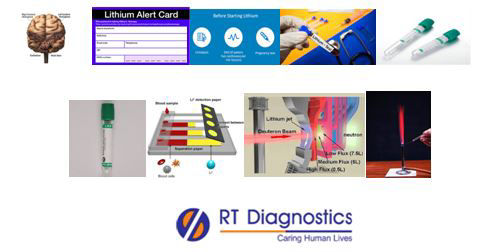Lithium test:
Why Lithium Test?
CLINICAL INFORMATION
Lithium (Li) is a naturally occurring alkali metal. It is an essential micronutrient required for overall health. Lithium is also present in trace amounts in the human body. Lithium alters the intra-neuronal metabolism of catecholamines. Some rich sources of lithium are animals, dairy products, grains, vegetables, meat etc. Signs of altered lithium could manifest as racing thoughts, depression, agitation, irritability, risky behaviour, trouble sleeping, suicidal thoughts, loss of interest in daily activities, and feeling sad and hopeless. At chronic stages when the levels of Lithium exceed higher concentrations in the body it can manifest as ataxia, drowsiness, muscular weakness, lack of coordination, dizziness, tinnitus, blurred vision, nausea, vomiting, tremors, kidney diseases including chronic tubule-interstitial nephritis, lithium nephropathy, reduced GFR and can cause certain neurological disturbances like confusion, speech impairment etc. Severe lithium toxicity is a medical emergency that can result in encephalopathy and cardiac arrythmias. Lithium is used as a mood stabilizer. Lithium is used as medication in psychiatry (anti-psychotic drug) to treat bipolar disorder (alternating periods of depression and mania), psychosis, mania, mood swings, manic depressive disorders, alcohol use disorder, depression, Alzheimer’s disease etc. Sudden withdrawal of long term lithium medication can have adverse effects like tremors, weight gain, rise in creatinine, diarrhoea etc. Some of the side effects include frequent urination, hair loss, increased thirst, edema, tremors, organ damage including kidney dysfunction, parathyroid dysfunction, hypothyroidism, cognitive dysfunction, nephrogenic diabetes insipidus etc. Symptoms of low lithium may include hypo-mania, regular periods of depression etc. Usually, the lithium test is ordered in cases like overdose of lithium medication (due to accidental consumption), prognosis (to assess the levels of lithium in blood – i.e not to exceed the therapeutic limit since it should be maintained in a narrow therapeutic range/window) etc.
Estimation of lithium includes methodologies such as Immunoassay, Spectrometry, Spectrophotometry, Inductively Coupled Plasma/Mass Spectrometry etc. Some factors that could alter lithium test results are ARBs, antibiotics, phenytoin, diuretics, NSAIDs, cardiovascular medications like ACE inhibitors, calcium channel blockers etc. While in contrast caffeine and theophylline lower lithium levels. Other additional tests include CBC, calcium (hypoparathyroidism), urinalysis, BUN, creatinine, thyroid function test, ECG, EEG, and low levels of norepinephrine (neurotransmitters and its receptor studies), high serotonin levels etc.

General Instructions:
Sample Requirement: Specimen - Blood sample collected from the vein. Test Preparation: Fasting Required.
NOTE - Sample for specimen collections may vary based on the patient’s condition/cases according to the patient’s presenting complaints/signs or symptoms:
SPECIMEN REQUIREMENT (Special or Rare Cases) - As instructed and guided by Physician / Clinician / Pathologist / as per Laboratory’s requirements, according to procedures and protocols.
This Multi-Specialty Clinical Referral Laboratory RT DIAGNOSTICS provides precise and accurate tests with an extensive range of testing services to the medical centres to help in the diagnosis and identification of pathology in the test specimens for infectious diseases and also to evaluate the function of organ systems of the patient. It prevents further complications and helps to stabilize and restore health to near normalcy at the earliest without delay.



